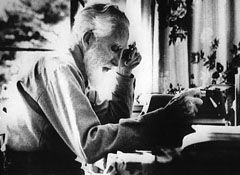 This Goodly Land
This Goodly Land
John Beecher (January 22, 1904–May 11, 1980)

Other Names Used
- John Henry Newman Beecher: full name
Alabama Connections
- Birmingham, Jefferson County: childhood residence, adult residence
- Tuscaloosa, Tuscaloosa County: education
- Montgomery, Montgomery County: brief adult residence
Selected Works
- Beecher, John. All Brave Sailors: The Story of the SS Booker T. Washington. New York: L. B. Fischer, 1945.
- Beecher, John. Land of the Free: A Portfolio of Poems on the State of the Union. Oakland, Calif.: Morning Star Press, 1956.
- Beecher, John. Report to the Stockholders & Other Poems: 1932-1962. Phoenix: [self-published], 1962. Rpt. [New York]: Monthly Review Press, 1962.
- Beecher, John. To Live and Die in Dixie, & Other Poems. Birmingham: Red Mountain Editions, 1966.
- Beecher, John. Hear the Wind Blow! Poems of Protest & Prophecy. New York: International Publishers, 1968.
- Beecher, John. Collected Poems, 1924-1974. New York: Macmillan, 1974.
- Beecher, John. One More River to Cross: The Selected Poetry of John Beecher. Ed. Steven Ford Brown. Montgomery: NewSouth Books, 2003.
Biographical Information
John Beecher, a descendant of the Rev. Lyman Beecher and related to Henry Ward Beecher and Harriet Beecher Stowe, was born in New York. His father, an executive with the Tennessee Coal, Iron, and Railroad Company, moved the family to Birmingham, Ala., when Beecher was about three. Beecher graduated from high school at age fourteen, and for the next sixteen years alternated between working in the steel mills and taking classes. His experiences in the steel mills inspired him to begin writing poetry. Beecher graduated with an AB in English from the University of Alabama in 1926, completed an MA in English at the University of Wisconsin in 1930, and, in 1933, began graduate studies in sociology at the University of North Carolina at Chapel Hill. From 1934 through 1942, Beecher worked for various New Deal government agencies. He also took time off to write, including periods writing for the Birmingham Age-Herald and News and the New York Post. In 1943, Beecher joined the United States Merchant Marine and served two years on the SS Booker T. Washington, the first U.S. ship to have a racially integrated crew. His book All Brave Sailors is about that experience. In 1948, Beecher became an assistant professor of sociology at San Francisco State College but was fired in 1950 for refusing to sign a mandatory loyalty oath. He was awarded a Ford Foundation fellowship to study small farmers in California and, when this ended, he bought and ran a small ranch in Sonoma County.
In 1956, Beecher and his wife Barbara, a graphic artist, started Morning Star Press at the ranch, then moved it to Arizona in 1958 and renamed it Rampart Press. The press printed Beecher's poetry and that of other blacklisted poets. In 1964, Beecher and his wife moved to the Southeast and began actively participating in civil rights activities. He was publicly denounced by Alabama Gov. George C. Wallace for his participation in the Selma to Montgomery March. In 1966, he published To Live and Die in Dixie, a collection of poems about his life in the segregated South. In the late 1960s, the Beechers began traveling around the country, he giving lectures and poetry readings and she selling copies of his books. He also served as poet-in-residence for several institutions (while maintaining a residence in Burnsville, N.C.) and received a fellowship from the National Endowment for the Arts. In 1977, Beecher was rehired by San Francisco State College, ten years after the loyalty oath law was determined by the courts to be unconstitutional. He taught there briefly before his death from lung disease in 1980.
Interests and Themes
John Beecher's poetry is an expression of his political and social activism. His powerful and accessible poems about working people and the disadvantaged make use of common speech patterns and dialect. Some of his work deals with Alabama subjects, including “In Egypt Land,” an epic poem about an Alabama sharecroppers’ union.
For More Information
Please check your local library for these materials. If items are not available locally, your librarian can help you borrow them through the InterLibrary Loan program. Your librarian can also help you find other information about this author.
There may be more information available through the databases in the Alabama Virtual Library. If you are an Alabama citizen, AVL can be used at your public library or school library media center. You can also get a username and password from your librarian to use AVL at home.
Reference Articles
- Merideth, Robert. "Homage to a Subversive: Notes Toward Explaining John Beecher". American Poetry Review 5.3. (1976): 45-46.
Reference Book Chapters and Encyclopedia Entries
- "Biography"; Guide to the John Beecher Papers, 1899-1972. Glen Rock, N.J.: Microfilming Corporation of America, . 1-8.
Reference Web Sites
- "John Beecher". Bhamwiki. 2007. http://www.bhamwiki.com/wiki/index.php?title=John_Beecher.
- Dickson, Foster. "John Beecher". The Encyclopedia of Alabama. 2009. Alabama Humanities Foundation and Auburn University. http://www.encyclopediaofalabama.org/face/Article.jsp?id=h-2068.
- Nelson, Cary, Jefferson Hendricks, and Leigh Harbin. "John Beecher [1904-1980]". Modern American Poets. 2002. University of Illinois at Urbana-Champaign. http://www.english.uiuc.edu/maps/poets/a_f/beecher/beecher.htm.
Location of Papers
- Boston University
- Duke University
- University of Arizona
- University of Texas at Austin
Photo courtesy of NewSouth Books.
Last updated on Jun 03, 2008.